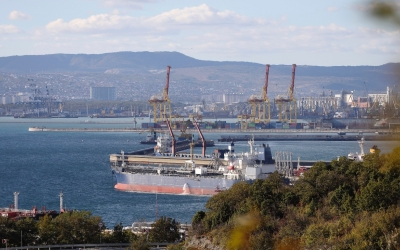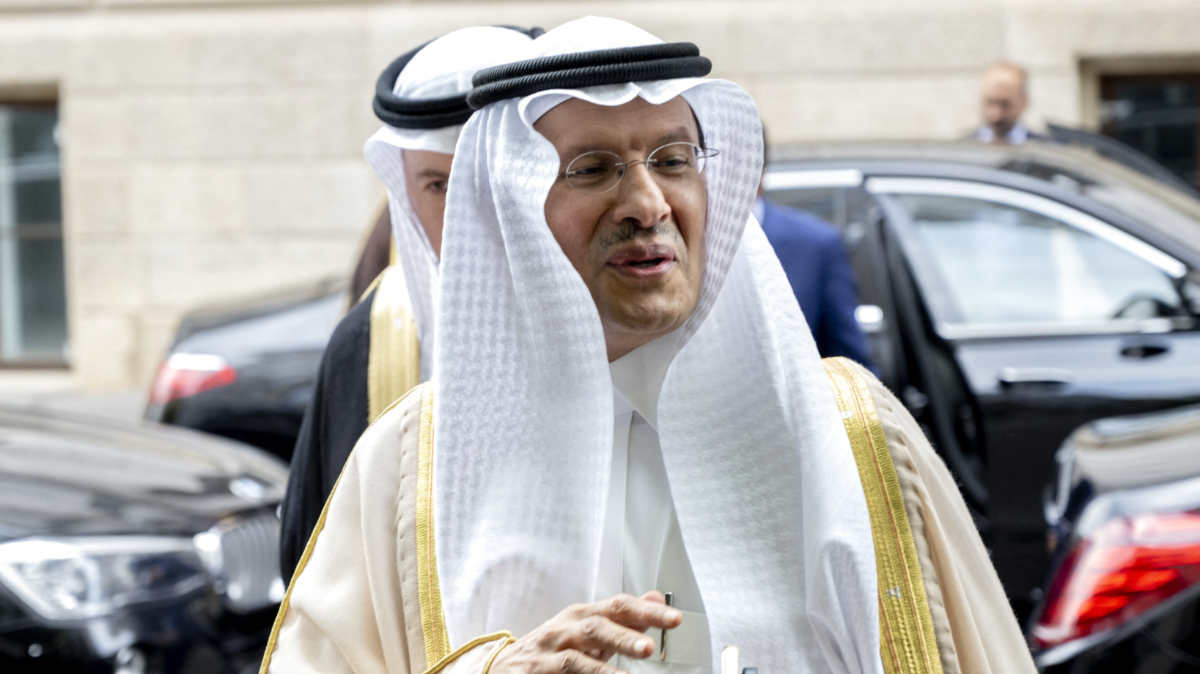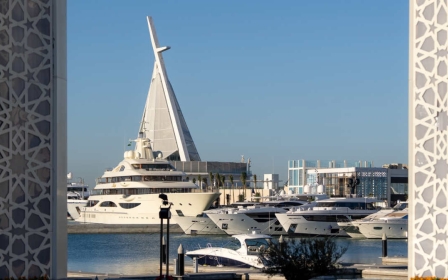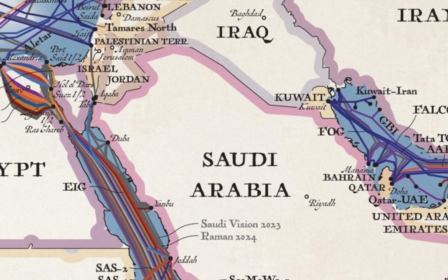Saudi Arabia's oil dilemma: Russia's free ride
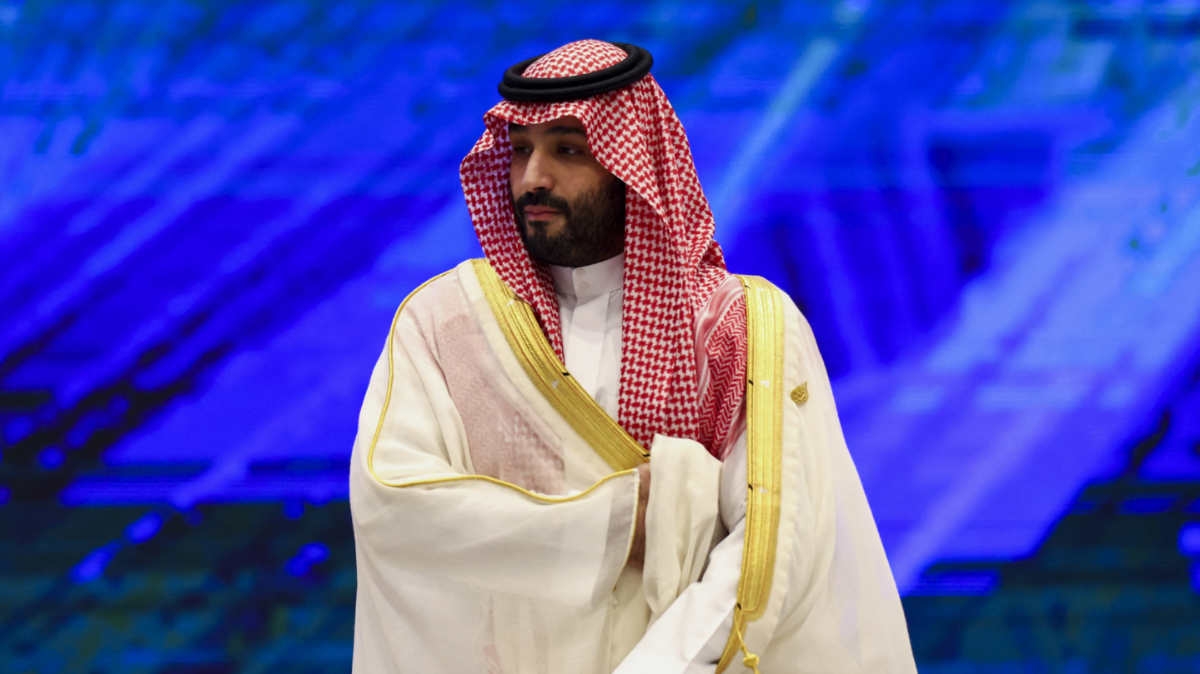
Saudi Arabia claimed a victory this week after Brent crude prices touched above a symbolic $80 per barrel threshold, but analysts warn the kingdom still has to contend with a “free-riding” Russia as it looks to tighten global oil supplies.
“People are seeing a rosier economic picture with the pace of interest rate rises cooling. The second half of the year generally also has higher oil demand,” Adi Imsirovic, director of Surrey Clean Energy, and former head of oil at Gazprom's overseas trading arm, told Middle East Eye.
“Oil hitting above $80 a barrel is a demand story, it’s not about supply,” Imsirovic said.
Brent’s move above $80 per barrel (it has since gone a shade below) is symbolic for Saudi Arabia because that is the price point the IMF says the kingdom needs to balance its budget and plow funds into mega-projects like Neom and Red Sea island developments, designed to diversify its economy away from fossil fuels.
For months now, Saudi Arabia has pushed members of the Organisation of the Petroleum Exporting Countries (Opec) and an alliance of oil producers led by Russia to cut global crude supplies.
New MEE newsletter: Jerusalem Dispatch
Sign up to get the latest insights and analysis on Israel-Palestine, alongside Turkey Unpacked and other MEE newsletters
The kingdom has led by example with a string of production cuts. And Energy Minister Prince Abdulaziz bin Salman has gone on the offensive, warning market speculators they would be “ouching like hell” if they doubted his willingness to cut further.
For good measure, in June, Abdulaziz unveiled plans for what he dubbed “a Saudi lollipop”, with the kingdom cutting an additional 1 million barrels more of Saudi crude in July - 10 percent of its output.
Any sign that prices are ticking upward is likely to be welcomed by the Saudis, who Carole Nakhle, head of energy consultancy firm Crystol Energy, said run the risk of being caught in “a vicious cycle” of cuts.
“If oil demand doesn’t pick up, or more supplies come onto the market, then they end up having to cut more each time just to put upward pressure on prices,” she told MEE.
Russia is 'cheating' Saudi Arabia
Saudi Arabia, historically the world’s biggest crude exporter, has been bearing the brunt of Opec cuts. On Thursday, the International Energy Agency said Saudi Arabia was set to lose its spot as the largest oil producer in Opec+ to Russia.
“Russia has been pretty much cheating and free-riding off of Saudi Arabia’s cuts,” Greg Priddy, a consultant at the US-based Spout Run Advisory and senior fellow at the Center for the National Interest in Washington, DC, told MEE.
'The Saudis are making a big effort for this relationship with Russia to work'
- Adi Imsirovic, Surrey Clean Energy consulting
In April, Russian crude exports hit their highest level since the invasion of Ukraine. Russia has generally shrugged off Saudi Arabia's bid for Opec+ members to join in production cuts. In addition to flooding the market, Russia has been selling its crude at discounted prices to make up for western sanctions.
Because oil prices are determined by supply and demand forces, analysts say Moscow has enjoyed the benefits of Saudi Arabia's cutting, without making any sacrifices itself.
Russia’s unwillingness to curb exports has led to rising tensions with Saudi Arabia, according to the Wall Street Journal.
One of the most sensitive issues for the kingdom, Imsirovic said, has been Moscow muscling into Saudi Arabia’s market share in Asia even as the kingdom cuts production. The two are vying for the top spot as China’s main oil supplier.
Meanwhile, Russian oil sales to India have already surpassed the total crude purchased from Saudi Arabia, the UAE, Iraq, and the US.
Russia has also been able to fetch a higher price for crude going to India than it had in the early months of the Ukraine war. According to a report by Times of India, Russian companies have been invoicing oil below the West’s $60 price cap, but beefing up shipping prices.
“There is a lot of scamming going on to evade the price cap,” Imsirovic added. “Money is funnelled back to Putin one way or the other, anyway.”
Saudi Arabia has been selling more oil to Europe, but “Asia is where the growth markets are", Imsirovic said.
"You don’t want to be losing market share in Asia to sell into Europe.”
Saudi Arabia's Opec+ illusion
Saudi Arabia and Russia joined forces in 2016 to create Opec+, an energy alliance that accounts for about 40 percent of the world’s crude supplies. But the partnership hasn’t been without its hiccups.
Three years ago, Saudi Arabia flooded the market with crude after Russia refused to enact cuts during the coronavirus pandemic. The decision came after a call between Russian President Vladimir Putin and Crown Prince Mohammed bin Salman descended into a "shouting match".
The feud saw a historic crash in prices that forced former US President Donald Trump to intervene to prop up the market.
This time around, however, Saudi Arabia and other producers, have some breathing space.
A historic rally last year saw Brent reach almost $140 per barrel. Opec’s revenue in 2022 hit the highest level in nearly a decade, as prices soared 54 percent to $873.57 bn from $566.44 bn the previous year, according to data released by Opec on Tuesday.
Current market conditions, with crude hovering near $75 per barrel, are tolerable, analysts told MEE.
“Historically speaking, prices aren’t that low. They don’t spell disaster for Saudi Arabia. I don’t think the situation is as alarming as some in the media convey,” Nakhle said.
Turning a blind eye to Russian "cheating" is also in keeping with Mohammed bin Salman’s switch to a more cautious approach to the kingdom's predicaments.
Costly military interventions in hotspots like Yemen that defined his early rule have given way to efforts to position Riyadh as a mediator. And he has turned to China and Russia as he strikes a foreign policy more independent from the US.
“The Saudis are making a big effort for this relationship with Russia to work,” Imsirovic told MEE.
At an Opec conference last week, Saudi Arabia said it would extend July’s one million barrels per day (bpd) production cut another month. The announcement was timed to coincide with a pledge by Russia to cut its exports by 500,000 bpd in August.
Abdulaziz boasted that the move silenced “the cynical side” of those who had speculated about a rift between Riyadh and Moscow over production.
“It took the Saudis decades to get Russia on board with Opec+ and they are loath to see it collapse now,” Imsirovic said. “But I think it’s an illusion. Saudi Arabia is the one doing all the heavy lifting.”
'It took the Saudis decades to get Russia on board with Opec+ and they are loath to see it collapse now'
- Adi Imsirovic, Surrey Clean Energy consulting
Gregory Gause, an expert on the Gulf at Texas A&M University, is sceptical that Moscow will follow through on its pledge, but said that Saudi messaging and cuts within Opec+ shouldn’t be written off.
“We have had stability in the oil market at a time when economic indicators, like recession prospects and slower than expected growth in China, would lead you to believe prices should be going down,” he told MEE.
“At the end of the day, prices have been relatively stable,” he said.
As of Thursday 4:33pm GMT, Brent crude was trading at $79.25 a barrel.
But Saudi Arabia still faces challenges as it looks to corral Opec members to choke supply, even outside of Russia.
The UAE is investing in new capacity and secured an increase in its production quota at last month's Opec+ meeting. On Monday, Iraq and French oil giant TotalEnergies signed a $27 bn deal to boost Baghdad’s production. Saudi Arabia itself wants to ramp up output in the coming years.
"Everyone is expanding capacity, but they are all talking about cutting," Imsirovic said.
Middle East Eye delivers independent and unrivalled coverage and analysis of the Middle East, North Africa and beyond. To learn more about republishing this content and the associated fees, please fill out this form. More about MEE can be found here.


